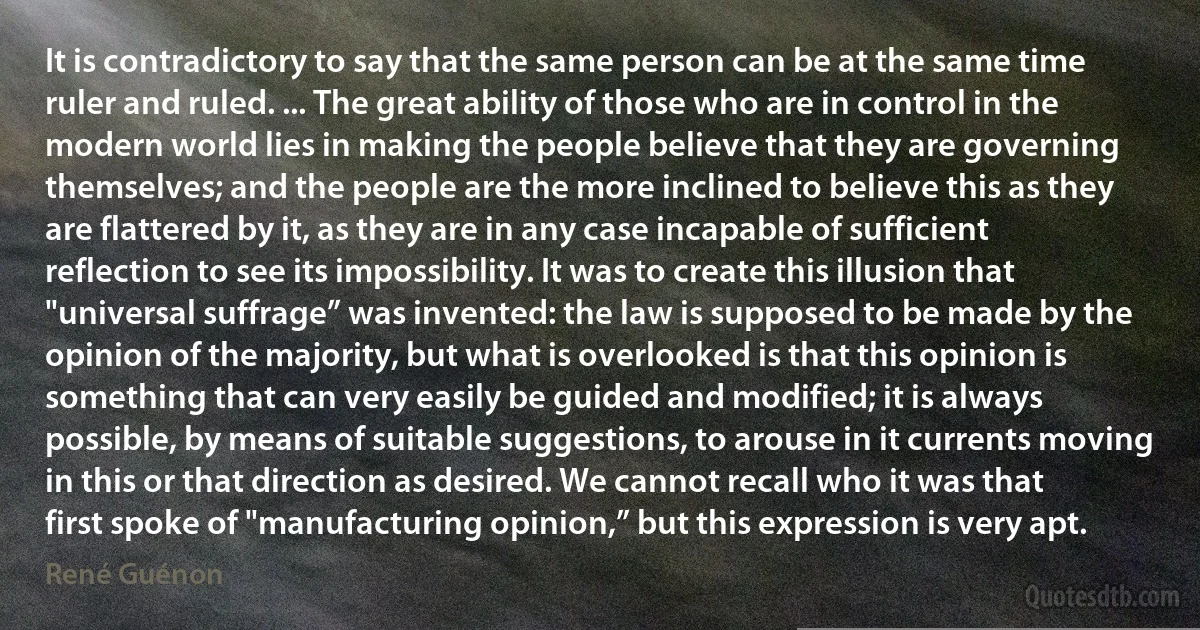
It is contradictory to say that the same person can be at the same time ruler and ruled. ... The great ability of those who are in control in the modern world lies in making the people believe that they are governing themselves; and the people are the more inclined to believe this as they are flattered by it, as they are in any case incapable of sufficient reflection to see its impossibility. It was to create this illusion that "universal suffrage” was invented: the law is supposed to be made by the opinion of the majority, but what is overlooked is that this opinion is something that can very easily be guided and modified; it is always possible, by means of suitable suggestions, to arouse in it currents moving in this or that direction as desired. We cannot recall who it was that first spoke of "manufacturing opinion,” but this expression is very apt.
René GuénonRelated topics
ability believe case contradictory control direction great law making manufacturing modified moving opinion people person possible reflection say see something spoke suffrage time universal world means liesRelated quotes
Yesterday I saw Mr. Thackeray. He dined here with some other gentlemen. He is a very tall man - above six feet high, with a peculiar face - not handsome, very ugly indeed, generally somewhat stern and satirical in expression, but capable also of a kind look. He was not told who I was, he was not introduced to me, but I soon saw him looking at me through his spectacles; and when we all rose to go down to dinner he just stepped quietly up and said "Shake hands”; so I shook hands. He spoke very few words to me, but when he went away he shook hands again in a very kind way. It is better, I should think, to have him for a friend than an enemy, for he is a most formidable-looking personage. I listened to him as he conversed with the other gentlemen. All he says is most simple, but often cynical, harsh, and contradictory.

Charlotte Brontë
It should be clear by now that there are people who can, in fact, be reasonably considered experts; that it is rational to rely, within limits, on ex pert opinion; and that it is possible, by exercising relatively simple criteria, to gain insight into whether a particular expert is reliable or not. It is also true that experts, of course, do make mistakes, and that even the agreement of a large majority of experts in a field does not guarantee that they got it right. That's the nature of scientific truth, as we have seen throughout this book: it is tentative, because it is the result of a human endeavor that is limited both by the type and amount of available evidence and by humans' finite mental powers and emotional reactions. But the examples above show how you can, with a little bit of practice, tell science from bunk!

Massimo Pigliucci
The concept of the « struggle for existence » has been applied to microbial interrelationships in nature in a manner comparable to the effects assigned by Darwin to higher forms of life. It has also been suggested that the ability of a microbe to produce an antibiotic substance enables it to survive Giom. in competition for space and for nutrients with other microbes. Such assumptions ppear to be totally unjustified on the basis of existing knowledge. Before we proceed with a discussion of the formation and activities of antibiotics under natural conditions, we must consider certain fundamental aspects of the problem of antibiotic production under controlled laboratory or factory conditions... All the discussion of a "struggle for existence" in which antibiotics are supposed to play a part, is merely a figment of the imagination, and an appeal to the melodramatic rather than the factual.

Selman Waksman
Meryl Streep, in her Protestant way, is stuck on words; she flashes clever accents as a mask for her deeper failures. (And she cannot deliver a Jewish line; she destroyed Nora Ephron's snappy dialogue in Hearburn.) Streep's work doesn't travel. Try dubbing her for movie houses in India: there'd be nothing left, just that bony, earnest horse face moving its lips. Imagine, on the other hand, lesser technicians like Hedy Lammarr, Rita Hayworth, Lana Turner: these women have an international and universal appeal, crossing the centuries. They would have been beautiful in Egypt, Greece, Rome, medieval Burgundy, or eighteenth-century Paris. Susan Hayward played Bathsheba. Try to picture Streep in a Bible epic! Streep is incapable of playing the great legendary or mythological roles. She has no elemental power, no smouldering sensuality.

Camille Paglia
The economic betterment of a nation which is at a low level of intelligence and culture, or in which the population is small in relation to the extent and productivity of its territory, is best accomplished through free trade with highly cultivated, rich, and industrious nations. In the case of such a country every restriction of trade, intended to plant manufacturing industry within its borders, is premature and injurious, not only to the welfare of mankind in general, but to the progress of the nation itself. Only when the intellectual, political, and economic education of the nation has so far advanced as a result of free trade that its further progress would be checked and hindered by the import of foreign manufactures and the lack of a sufficient market for its own goods, can protective measures be justified.

Friedrich List
